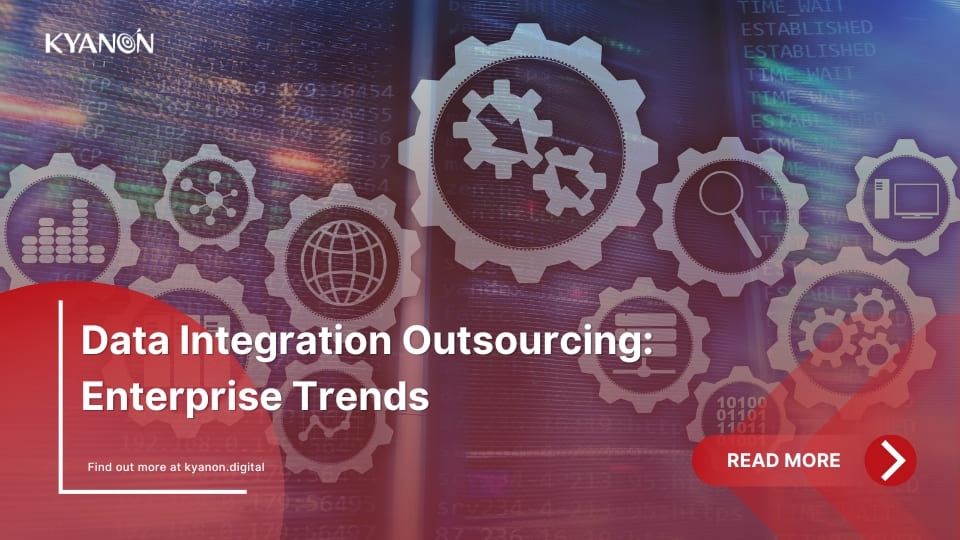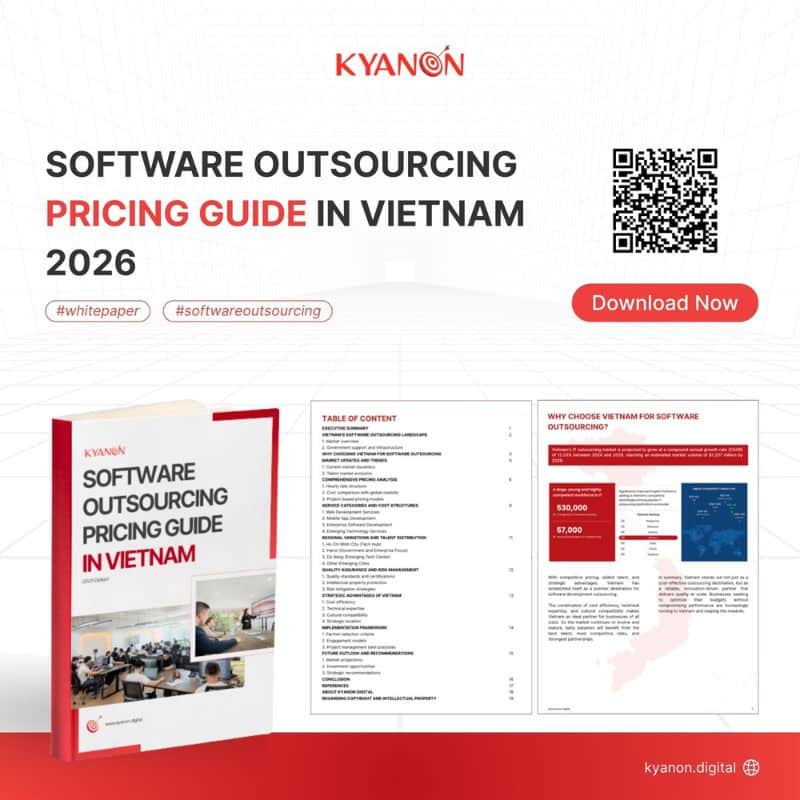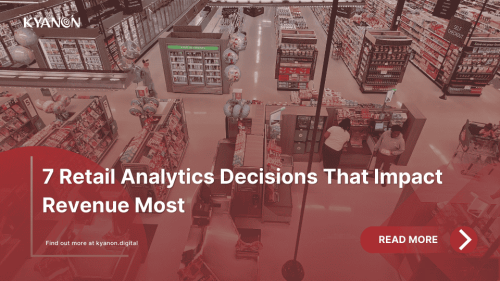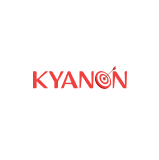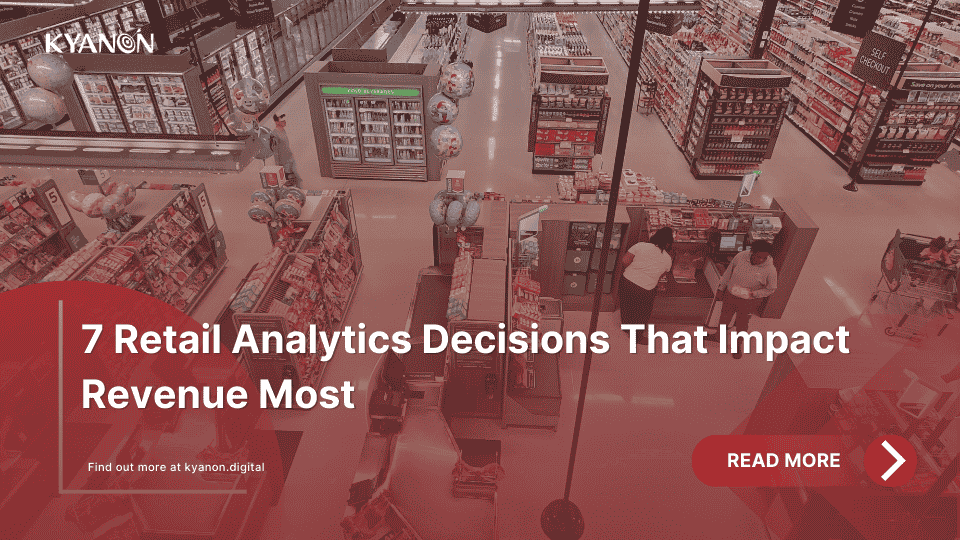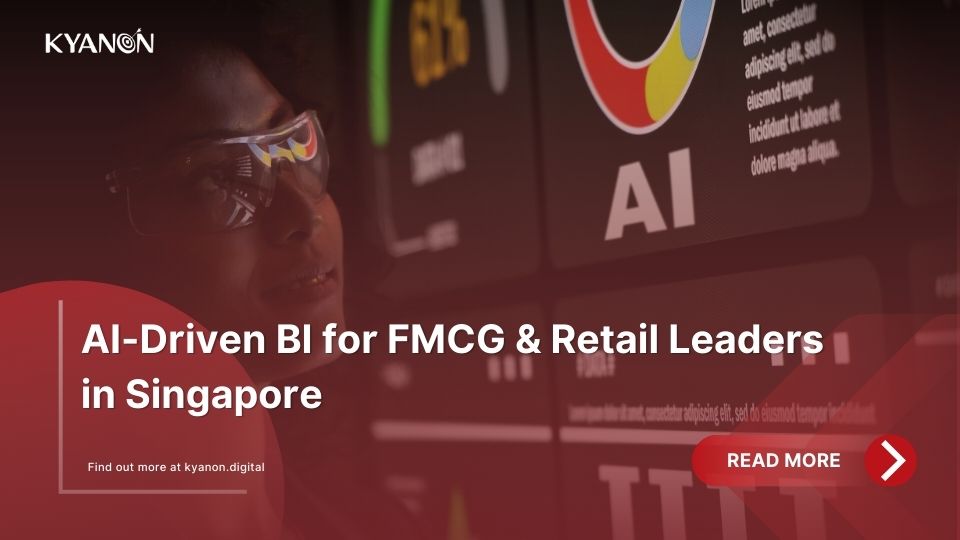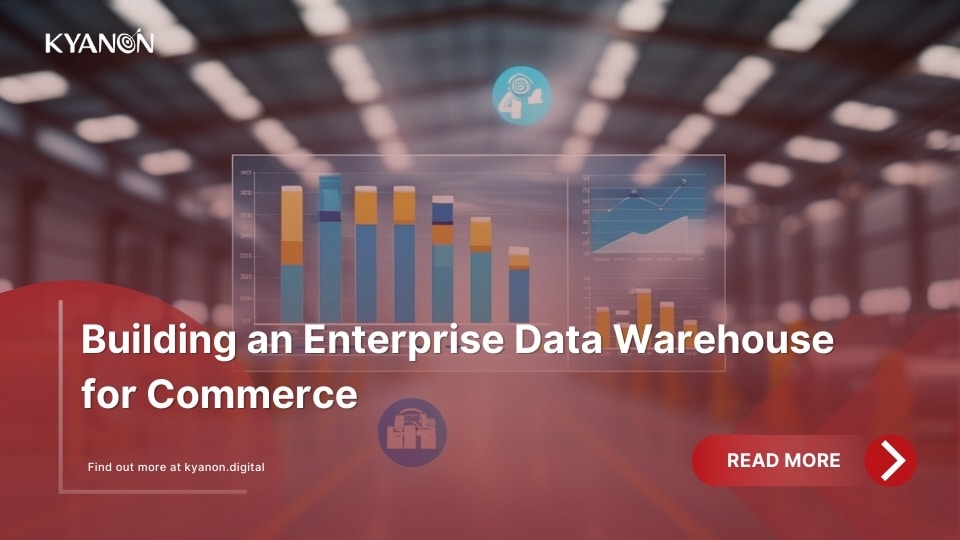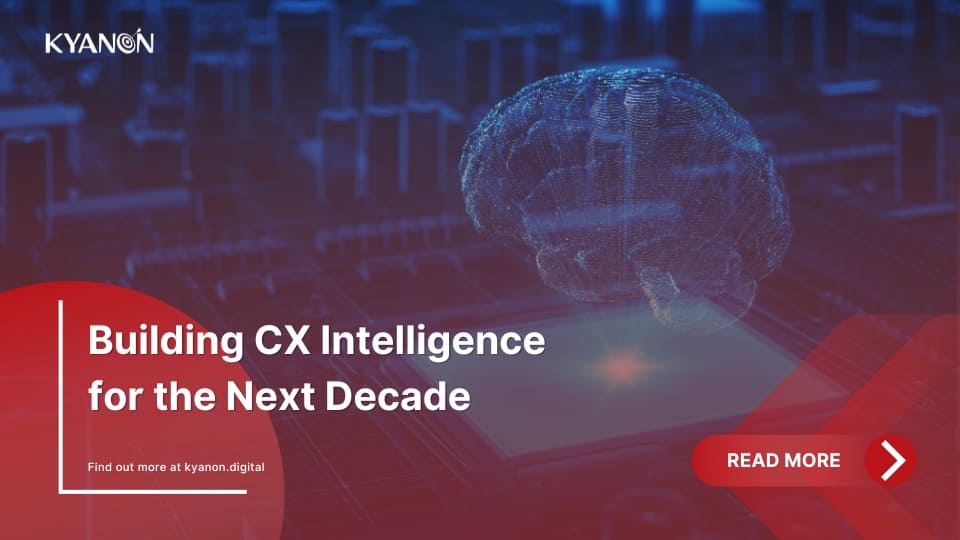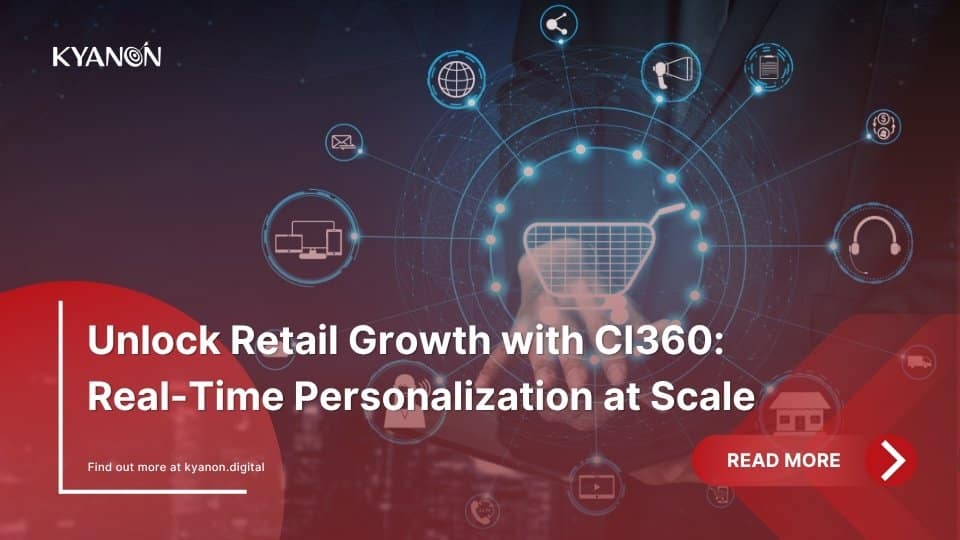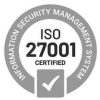Organizations today generate massive volumes of data from multiple sources. Managing this complexity efficiently is a critical challenge to extract actionable insights. Without effective integration, data silos hinder operational agility and limit strategic decision-making, creating inefficiencies across the enterprise. Hence, how can companies unify this fragmented information to drive growth and innovation?
Research shows that enterprises leveraging data integration outsourcing and advanced data integration solutions can consolidate disparate datasets, enabling faster analysis and more informed decisions. In this article, Kyanon Digital explores key market trends and practical approaches for enterprises to leverage outsourced data integration services and optimize enterprise data integration capabilities.
Key Takeaways
- Data integration outsourcing is a strategic enabler: Delegating enterprise data integration to specialized providers allows organizations to unify disparate data sources, improve operational efficiency, and focus internal resources on core business objectives.
- Advanced technology drives efficiency: Leveraging AI-driven automation, real-time data pipelines and flexible integration tools ensures high-quality data processing & outsourced services.
- Market trends highlight adoption drivers: Enterprises increasingly turn to outsourcing due to skills shortages, hybrid/multi-cloud complexities, real-time analytics needs and regulatory compliance requirements. Outcome-based and managed-services models are becoming the preferred approach.
- Choosing the right partner is critical: Evaluate providers based on industry expertise, security and compliance certifications, technology capabilities, scalability and effective project management to maximize business value.
Further reading:
What is data integration outsourcing?
Data integration outsourcing is the practice of delegating an organization’s data integration tasks to specialized third-party providers. It enables enterprises to efficiently manage data from multiple sources. By leveraging external expertise, organizations can achieve high-quality enterprise data integration while focusing internal resources on core business objectives.
Transform your ideas into reality with our services. Get started today!
Our team will contact you within 24 hours.
Key aspects of data integration outsourcing
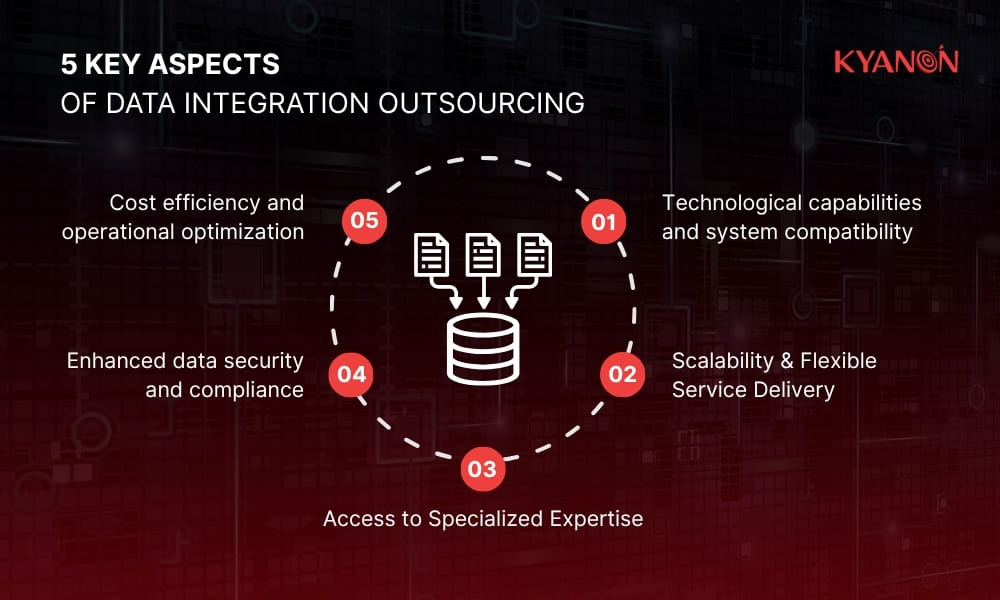
Technological capabilities and system compatibility
- Advanced tools enable real-time data processing, schema auto-detection and automated quality monitoring to ensure seamless integration across complex enterprise architectures.
- Integration solutions maintain compatibility with both legacy on-premises systems and modern cloud-native platforms, minimizing operational disruption and supporting reliable data flows.
Scalability and flexibility in service delivery
- Services can scale dynamically to accommodate growing data volumes and increasing complexity without requiring additional infrastructure.
- Flexible service agreements allow enterprises to adapt integration workflows over time, ensuring business requirements are met while maintaining operational agility.
Access to specialized expertise
- Enterprises gain advanced domain knowledge and industry best practices that may not be available in-house.
- Providers handle complex integration challenges, enforce governance standards and optimize data processing workflows to deliver high-quality data integration solutions.
Enhanced data security and compliance
- Robust security protocols, including encryption, access control and continuous monitoring protect sensitive enterprise data throughout processing and transfer.
- Integration solutions are designed to comply with global regulations such as GDPR and CCPA, supported by metadata management and audit trails.
Cost efficiency and operational optimization
- Outsourcing converts fixed infrastructure and labor costs into predictable, variable expenditures, providing a cost-effective alternative to in-house operations.
- Automated workflows and expert management enhance efficiency, reduce manual intervention and allow internal teams to focus on strategic business initiatives.
Market outlook: Why are enterprises turning to outsourcing?
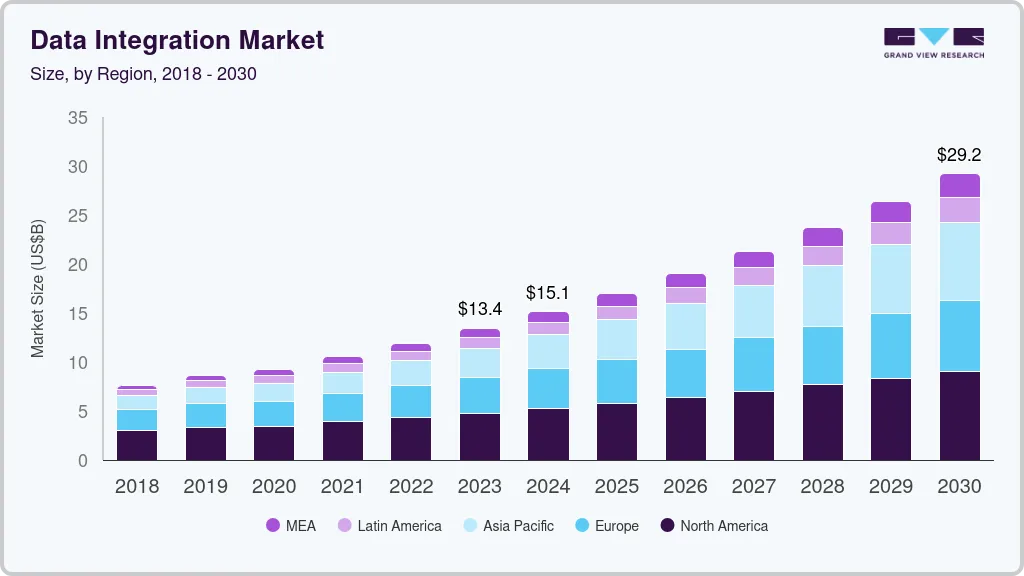
The accelerating expansion of the data integration market, projected to grow at a CAGR of 13.1% from 2023 to 2030 (Grand View Research) reflects mounting pressure on enterprises to unify fragmented information sources into a single view. As organizations scale digital operations, the complexity of managing diverse data pipelines, cloud ecosystems and real-time analytics increases rapidly. This environment makes outsourcing an attractive pathway to reduce operational burden while achieving higher integration reliability.
Enterprises are also shifting to outsourcing to optimize resource allocation and address skill shortages in advanced integration solutions. Providers deliver capabilities and infrastructure that would require substantial investment if developed internally.
Key factors driving this shift include:
- Rising data volume and velocity, which outpace traditional in-house processing capacities.
- Demand for unified and governed data flows across cloud, hybrid and on-premises environments.
- The need for continuous availability and low-latency access to consolidated information.
Key enterprise trends in data integration outsourcing
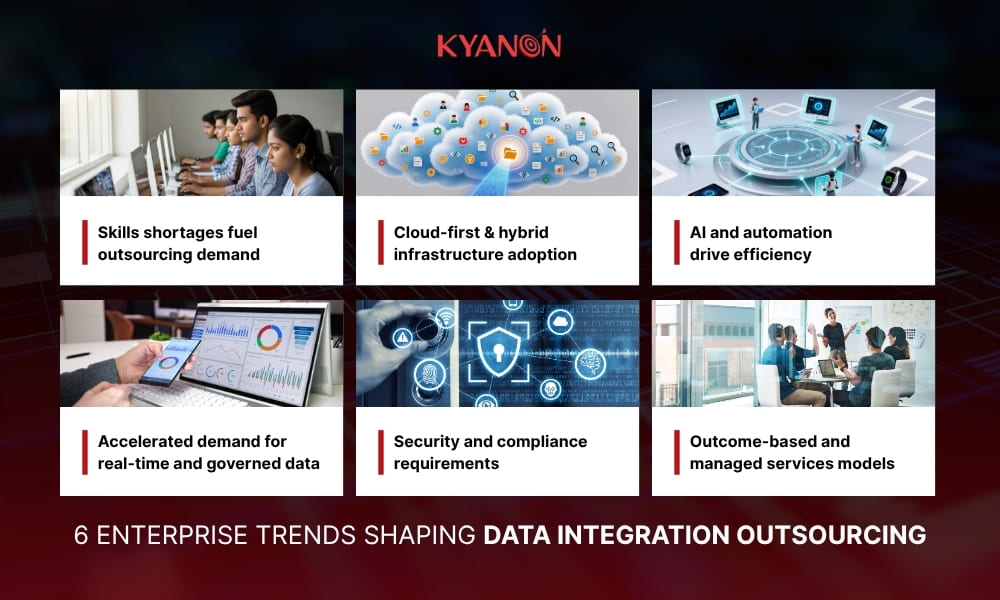
Skills shortages fuel outsourcing demand
Many organizations face a significant shortage of in-house talent in data engineering, AI/ML, and integration architecture. According to Mordor Intelligence, this skills gap is driving enterprises to rely on third-party data integration service providers to fill these critical roles.
Cloud-first & hybrid infrastructure adoption
The shift toward hybrid and multi-cloud environments is increasingly complex, and not all enterprises have the internal capacity to manage it. Outsourcing providers often specialize in managing cross-environment pipelines.
The Mordor Intelligence report highlights that hybrid-cloud deployment models are growing rapidly. This enables flexible architecture and supports scalable data integration solutions.
AI and automation drive efficiency
Enterprises are integrating artificial intelligence and automation into their data workflows and engaging external partners to implement these solutions. Outsourced data integration services reduce manual overhead while maintaining high data quality.
As reported by Business Research Insights, AI-driven integration is an emerging trend with increasing adoption of automation and AI-based data integration tools. Automation of complex ETL and data-cleaning tasks accelerates transformation times and improves operational efficiency.
Accelerated demand for real-time and governed data
Companies increasingly demand real-time data processing for analytics and operational decision-making. According to Market Research Future, real-time integration and continuous data streaming are among the top enterprise trends, resulting in greater reliance on external integration services to build and maintain these pipelines.
Outsourced teams deploy and manage streaming architectures capable of handling high-velocity data, implementing data governance, metadata tracking and compliance frameworks at scale.
Security and compliance requirements
As global data privacy regulations continue to evolve, enterprises are prioritizing outsourcing providers with not only technical capabilities but also strong compliance expertise. Security and governance represent critical decision factors with integration partners expected to implement regulatory controls (e.g., GDPR, CCPA) and maintain comprehensive audit trails.
Implementing these controls mitigates legal and operational risks while ensuring that integrated data solutions comply with regulatory mandates.
Providers bring established frameworks and secure technologies to manage data integration, enforce governance policies and maintain operational integrity.
Outcome-based and managed services models
Instead of traditional project-based contracts, enterprises are increasingly preferring outcome-based or managed-services engagement models with their outsourcing partners.
By tying fees to performance metrics or business outcomes (e.g., data latency, integration uptime), companies align costs more closely with value delivery. This incentivizes providers to optimize data integration for performance, reliability and business value. Risk is also shared, making long-term partnerships more attractive.
How to choose the right data integration outsourcing partner?
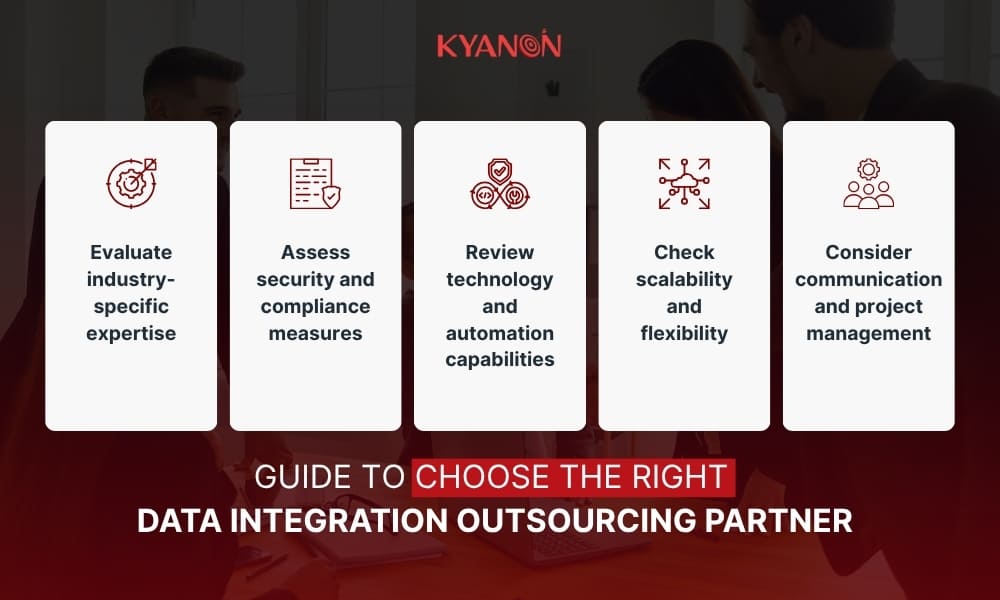
Evaluate industry-specific expertise
- Proven experience reduces compliance risks and accelerates onboarding.
- Industry-focused providers understand sector-specific data formats, workflows and reporting requirements.
Select a partner with demonstrated experience in your sector to ensure that data integration solutions align with industry regulations and business practices. Examine case studies, client references and prior projects that highlight proficiency in similar enterprise environments.
Assess security and compliance measures
- Strong governance protects sensitive information during transfer and integration.
- Regulatory alignment minimizes legal exposure while maintaining operational efficiency.
Prioritize vendors certified under ISO 27001, SOC 2 and other relevant standards. Ensure secure infrastructure, robust encryption and clearly defined data handling and retention policies in line with GDPR, HIPAA or other applicable regulations.
Review technology and automation capabilities
- Automated pipelines accelerate ETL operations and improve data quality.
- Flexible tools allow seamless connection with both cloud-based and on-premises platforms.
The outsourcing partner should leverage advanced data processing technologies, AI-driven automation and flexible integration tools. Compatibility with your systems ensures accurate, scalable and efficient data integration services.
Check scalability and flexibility
- Scalable solutions accommodate peak data loads without disruption.
- Flexible frameworks allow integration of new applications or data sources over time.
Choose a provider with adaptable service models capable of scaling with enterprise data volumes, formats and workflow complexity. Service flexibility ensures continuity as business requirements evolve.
Consider communication and project management
- Clear governance structures improve issue resolution and milestone tracking.
- Regular updates and alignment meetings enhance transparency and partnership effectiveness.
Strong communication practices and structured project management are essential for successful partnerships. Assess reporting methods, responsiveness, time zone compatibility and cultural fit to ensure smooth collaboration.
Kyanon Digital: Your trusted outsourcing partner for data integration

Kyanon Digital is a Vietnam based leading Digital & Technology Company empowering businesses to achieve Growth and Impact through Completed Technology Solutions. We are a trusted partner to Make Digital Impact. It’s not only about Technology, it’s about the impact of business processes, ensuring happy customer experience and optimizing operations.
- Website: kyanon.digital
- Founded: 2012
- Team size: 500+ (across Vietnam, Singapore, Thailand, Australia, Malaysia)
- Pricing tier: $25 – $49/hr
- Key clients: Confidential (fast-growing startups and regional enterprises)
Strengths:
- End-to-end data integration solutions connecting ERP, CRM and analytics platforms.
- AI-driven data processing & outsourced services for efficient, accurate enterprise workflows.
- Scalable and flexible platforms designed for complex, multi-system environments.
- Expertise in real-time data pipelines, automation and business intelligence integration.
Kyanon Digital’s case study: AI-Driven BI & Data Warehouse for a Leading Retail Corporation

Kyanon Digital partnered with a major retail corporation to design and implement an AI-powered data warehouse and business intelligence platform, integrating data from multiple systems and legacy sources into a single, unified view. The solution enabled real-time insights, predictive analytics, and improved decision-making across operations.
Through advanced data processing and automation, the client achieved faster reporting cycles, better inventory management and actionable insights that supported strategic business initiatives.
Read the full case study: AI-Driven BI & Data Warehouse for a Leading Retail Corporation
Kyanon Digital’s Data Integration Projects Rewind:
- Operational & Financial Dashboard Development for EFL
- Unifying Customer Data & Loyalty Across Business Units for One of the Largest Japanese Groups in Vietnam
Conclusion
Data integration outsourcing has become a strategic imperative for enterprises navigating the complexity of modern data ecosystems. By leveraging specialized providers, organizations can implement enterprise data integration solutions that deliver actionable insights for decision-making.
Take the next step in modernizing your data strategy with a partner experienced in delivering high-quality data integration services across complex enterprise environments. Contact Kyanon Digital today to explore how professional data integration outsourcing can optimize your enterprise operations and drive measurable business value.

